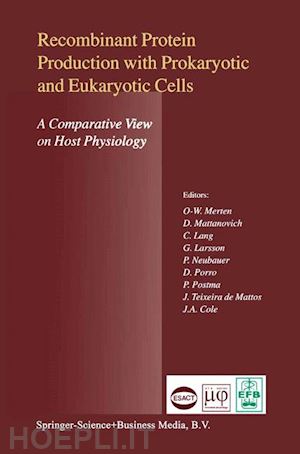List of Editors. Foreword. Cell-free translation systems. Protein synthesis and co-translational folding in cell-free translation systems; A.S. Spirin. Metabolic burden and stress response. The cellular response to unfolded proteins in the endoplasmic reticulum; R. Kaufman, et al. The effects of recombinant protein expression on the growth and metabolism of mammalian cells; C.A. Yallop, I. Svendsen. Mapping stresses in Escherichia coli to improve yield. Examining global gene regulation and `cell conditioning' strategies; M.P. DeLisa, et al. Cellular responses to strong overexpression of recombinant genes in Escherichia coli. DNA relaxation and cell death after induction of alpha-glucosidase; H.Y. Lin, et al. From Vitreoscilla hemoglobin (VHb) to a novel class of growth stimulating hemoglobin proteins; P.T. Kallio, et al. Genetic stability and gene copy number effects. Protein mass production in hybridomas and recombinant CHO cells; R. Kunert, et al. Inducible gene copy number amplification for the production of heterologous proteins in Kluyveromyces lactis; M.M. Bianchi. Antibiotic-free plasmid selection and maintenance in Bacteria; J.A.J. Hanak, R.M. Cranenburgh. Modelling of segregational plasmid instability of a recombinant strain suspension of Escherichia coli; J. Boudrant, et al. Transcription, translation, and product formation in E. coli. Production of optically pure aryl epoxides by recombinant E. coli carrying styrene monooxgenase. A new biocatalyst based on pseudomonas fluorescens ST genes; A. Colmegna, et al. Translational problems associated with the rare arginine CGG in Escherichia coli. Framshifting at CGG codons; D.E. McNulty, et al. Optimisation of the solubility of the recombinant Itk kinase domain in Escherichia coli; N. Meinander, et al. Bacterial senescence and the oxidation paradox; T. Nyström, et al. Metabolic approaches for the optimisation of recombinant fermentation processes; G. Striedner, et al. Control and optimisation of cellular bottlenecks in recombinant protein production; A.M. Sandén, G. Larsson. Expression and fermentation strategies for recombinant protein production in Escherichia coli; P. Neubauer, J. Winter. Transcription, translation, and product formation in microbial systems other than E. coli. Overexpression of a Rhizopus oryzae lipase in Pichia pastoris strains containing multiple copies of the target gene; A. Serrano, et al. Development of a heterologous gene expression system for use in Lactocossus lactis. A novel gram-positive expression system; L. Bredmose, et al. Metabolic network analysis for human therapeutic protein productions: effects of P/O ratio; P. Calik, T.H. Ózdamar. Animal cell based expression systems &endash; process optimisation. Process-oriented metabolic engineering: cell lines with new properties in nutrient exploitation and protein glycosylation; R. Wagner. Influence of the metabolic status of packaging cells on retroviral vector production; O.-W. Merten, et al. Optimizing the production of recombinant prion protein from CHO cells; S. Bocking, et al. Recombinant protein production by transient transfection of suspension-growing cells; Y. Durocher, et al. Comparison of different microbial expression systems. Production of recombinant human trypsinogen in Escherichia coli and Pichia pastoria. A comparis











